|
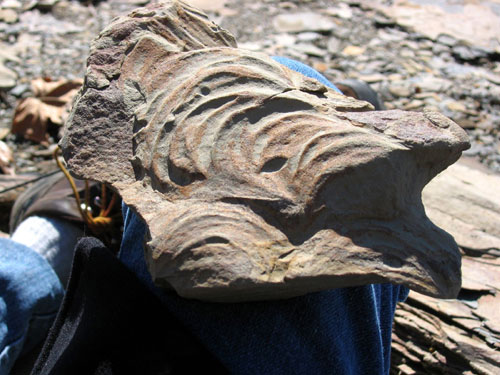
A glimpse into the past (Zoophycus trace fossil), as we
think about the future.
(*photo
credit)
December
1, 2009 Turn Our Thoughts to Copenhagen
Glaciers
are melting; oceans are rising; more frequent violent storms and
floods are coming; flora and fauna are under severe impact;
human-caused mishaps abound. These are not passages from
Revelations or the predictions in the Gospels; these are the
results of knowledgeable reports by respected international groups
in the year 2009.
Oxfam
International says that small farmers around the world are
suffering. Seasons appear to have shrunk in number and variety;
rainfall is more unpredictable, tending often to be shorter in
duration; winds and storms are felt to have increased in strength;
and unseasonable events such as storms, dense fogs and heavier rains
are more common. Oxfam concludes that climate related hunger may
become the defining tragedy of this century, (The Guardian Weekly,
July 10-16, 2009, p. 1-2).
The
Global Humanitarian Forum, headed by former UN Secretary General
Kofi Annan, says that climate change is already responsible for
300,000 deaths each year, and this will rise to a half million each
year by 2030. If climate change is not brought under control, 310
million more people will suffer adverse health effects within a
quarter of a century; and economic costs due to these conditions
will rise from $125 billion today (more than all humanitarian aid to
developing nations) to $600 billion a year by 2050. (The
Guardian Weekly, June 5-11, 2009, p. 1-2).
On
October 12, 2009, the British Committee on Climate Change
reports on efforts to reduce United Kingdom 1990 greenhouse
emissions 80% by 2050; annual averages are dropping less than 1%,
rather than the 2-3% average anticipated. "The market, left to its
own devices, is failing to deliver. Consumers are not buying energy
efficient appliances or insulating their houses, carmakers are
failing to get emissions down and powerplants still prefer fossil
fuels to greener alternatives. A bracing dose of re-regulation was
prescribed" (The Economist, Oct. 17, 2009, p. 66).
Will
there be positive results from Copenhagen? While the developing
nations face stark consequences just described, the developed
nations are slow to move even according to Kyoto Protocols (the
European Union greenhouse gas emissions have dropped 2% since 1990
and the United States has risen 14%). Since the turn of the century
developing nations such as China, India, and Brazil have overtaken
and surpassed the developed world as emissions leaders. Poorer
nations call for funds to help tide them through conservation
measures needed to meet their share. India does not want to reduce
its own emissions until it is equal on a per capita level with those
of the West (that means doubling current Indian emissions). If the
developed lands do not conform to strict lifestyle changes neither
will the equally materialistic developing lands. Is the stage set
for Earth's mutually assured destruction?
Prayer: Lord, awake us to the consequences of our actions.
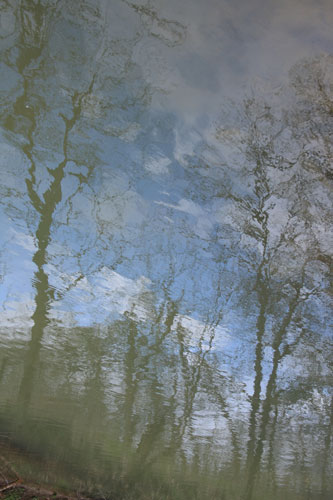
Nature's reflections
(*photo
credit)
December
2, 2009 Question the St. Francis Pledge's Completeness
With our
growing doubts about the upcoming Copenhagen Climate Change
Conference, all of us need to ask whether we are doing our part in
bringing about a green solution. Is merely taking vaguely worded
pledges sufficient, for even when we do our part, we are not
addressing the bigger issues? Are we only tweaking an addictive
materialistic consumer system and addressing neither our own
individual difficulties nor those of the global policy of mutually
assured destruction of our planet? For instance, the following
popular pledge that is moving about church circles is a perfect
"cultural" -- not countercultural -- product, something that the
Christ who drove the moneychangers from the temple would most likely
not have felt satisfied reciting. Ought we?
----------------
The St. Francis Pledge to Protect Creation and the Poor
*
Pray and reflect on the duty to care for God's creation and for the
poor and vulnerable;
*
Learn about and educate others on the moral dimensions of climate
change;
*
Assess our participation -- as individuals and organizations -- in
contributing to climate change;
* Act
to change our choices and behaviors contributing to climate change;
*
Advocate Catholic principles and priorities in climate change
discussions and decisions, especially as they impact the poor and
vulnerable.
------------------------
Certainly we have done these five acts and more: we called for
prayer yesterday; we educate others as this website strives to do;
the two hundred Earth Healing environmental resource assessments
over two decades speak for the value of assessment by both
individuals and organizations; 99 Ways to a Simple Lifestyle
and Healing Appalachia: Sustainable Living through Appropriate
Technology are directed to personal change; and advocating
Catholic principles and priorities as they impact the poor are
important.
But are
stating these enough? Doubts arise for unless the advocacy becomes
more specific, most will ignore the social demands on each citizen.
A capitalist (as well as communist) materialistic culture continues
to degrade the world, and unless all the weaknesses of the "free
market" and "consumer culture" economy are directly and explicitly
addressed, business as usual, with tweaking of various techniques
and devices, will only at best slow the steady and inevitable
destruction of our planet. The part that is not addressed in the
pledge is that -- Our consumer culture must be confronted and
condemned -- not tweaked. The reason most are reluctant to
become full pledge-makers is that they do not want to bite the hands
that feed them. Instead of being countercultural, they conform and
in no way confront the "economic system."
Prayer: Lord, buck up our courage; strengthen our backbone.
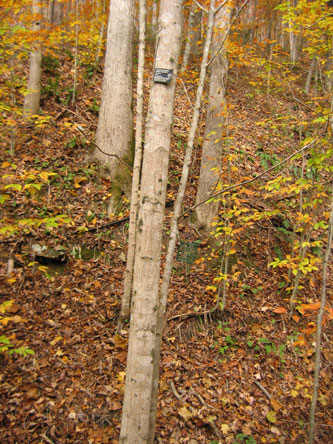
Tree identification tags at the Mary E. Fritsch
Nature Center
Appalachia - Science in the Public Interest (ASPI)
(*photo
credit)
December
3, 2009 Participate in Eco-Walk Programs
In our
town, on every second Sunday of the month some streets are closed
off so that citizens will have a chance to get some exercise; they
are invited to walk together for exercise and fresh air. Four years
ago Mazda Motors, the Japanese automaker, encouraged its 20,000
employees to walk to work in order to improve workers' health and to
cut back on air pollution. Those who walked more than four
kilometers on a round trip on a regular basis (at least 15 days a
month) received the equivalent of $12 per month. Some workers left
a bus or train early and walked the rest of the way on foot, so that
they could reach the acceptable total distance. Mazda is not
alone; a year before, Yamaha, the motorcycle maker started a
similar eco-walk.
Obesity,
commuter congestion, air pollution and carbon footprints are all
reasons for considering eco-walks as sound policy. However, these
exercises should not be done only on an occasional basis. They
should be regularly used. Nevertheless, walking to work or for
physical exercise requires safe walkways that are not always
accessible to people in our urbanized and overly congested world.
All too
often parents seek to be good to their charges and so take them to
the school door with no chance for the youngster to have any extra
exercise. The cars move ahead one car length at a time. Each child
performs the least amount of exercise in moving from vehicle to
school door. Later, after school with its similar door-to-door
pick-ups and drop-offs, some of the more dutiful parents drive their
kids to an exercise place so as to prevent the youngster from
becoming a complete couch potato. It's a far cry from when we'd
decide to walk home from school for several miles rather than take
the bus.
Walking
benefits go beyond fuel saved and less air pollution:
*
Walking allows us to look out and see the countryside, and get a
feeling for the environment in which we walk; that gives us a
different perspective from that obtained in an auto ride.
*
Walking allows us more time to pray and reflect on what will occur
that day or the following weekend; driving requires concentration,
a note to emphasize to vehicle cell phone users.
*
Walking becomes an example for others to follow; many passing
drivers will say to themselves, "I really should be doing the same
thing for my health and well being." Convincing?
*
Finally, walking is a public act of commitment to saving Earth's
limited resources by immediately understood green action.
Prayer: Lord, You walked together with our ancestors on their journey of
faith. Teach us to journey, through walking with You.
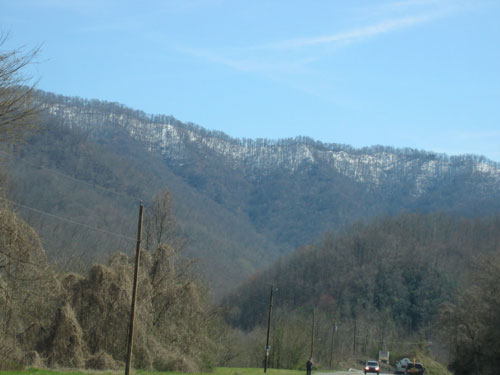
Winter's arrival on snowy mountaintops, Harlan Co., KY
(*photo
credit)
December
4, 2009
Have a New Soup Every Day
Today is
my 338th soup of this year: Cream of Celery and Potato Soup.
The food creativity resulted from accepting the challenge that I
could live with daily variety on a food stamp-size food budget for a
year -- and still share the money with an orphan in India. True,
many of these soups are simple modifications of standard soups, but
they do represent a series of culinary delights on a slim budget.
In winter, it is time for cooks, acting like jazz improvisors, to
step forward with their creations. Send some of your varieties for
2010.
Having
soup during hot weather (it was fortunately a mild summer by
Kentucky standards) was unusual. However, winter has few other
rewards as great as hot soup. The original concept of soup-making
must have been food conservation, namely, saving all the cooking
juices and leftovers and putting them together into one batch. A
creative cook can change the taste of soup in endless ways because
of the variety of basic ingredients and spices that can be mixed
in. However, some basic soups such as split pea soup come out the
same way week after week unless -- we change the nature of it by
adding spices, veggies, herbs, meats, bouillon or combinations with
traditional soups to create a new essence of soup. Why keep to the
old recipes?
Traditional pea soup attracts a certain group of people, namely the
ones who like the same things over and over. They have their place
in the world, but it truly takes more effort to keep to the
traditions than to adapt the philosophy of a new soup every day.
"Split pea people" like operas sung a certain way, Thanksgiving
meals with certain courses in a proper order, Sacred Liturgy
performed exactly the same way with homilies of the same words said
again and again. For these folks, vacations involve going to the
same places and indulging in the same entertainments as practiced
year after year. These folks complain to the cook who has made a
different soup -- and that can be an indictment rather than a
compliment by saying, "Don't foist your creativity on me."
With
growing tolerance, we return to the original idea of soup being the
nutritious leftovers mixed in creative ways. Using our talents to
vary our meals can be a challenge and an opportunity in a food short
world. Shake up those who see routine as their God-given right;
rather, make each day a unique and special gift from the Creator.
While routine saves time, it can become a rut that fast food giants
also see as profitable; they want customers to order only a limited
variety of hamburgers, fries, and hot dogs. We note that the
affluent who eat out often can afford to choose from a host of
ethnic restaurants (Mexican, Chinese, Italian, Thai, etc.). Why not
everyone create variety at home? In fact, the "burgoo people" of
Kentucky insisted on variety of ingredients, including an assortment
of hunted varmints along with root vegetables. Pioneers believed in
culinary adventure; so ought we.
Prayer: Creator Lord, make us creative in soup-making skills.
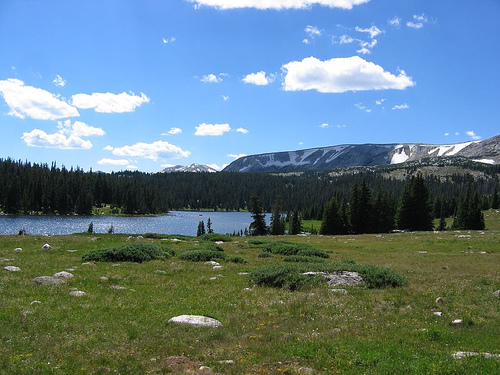
Medicine Bow National Forest, Wyoming
(*photo
credit)
December
5, 2009
ARE the United States Unique?
Before
the Civil War citizens said, "the United States are." Afterwards
"is" meant our single nation. However, each state has unique
culture, philosophy and descriptive adjectives such as:
Alabama -- most...folksy Montana ...vast, expansive
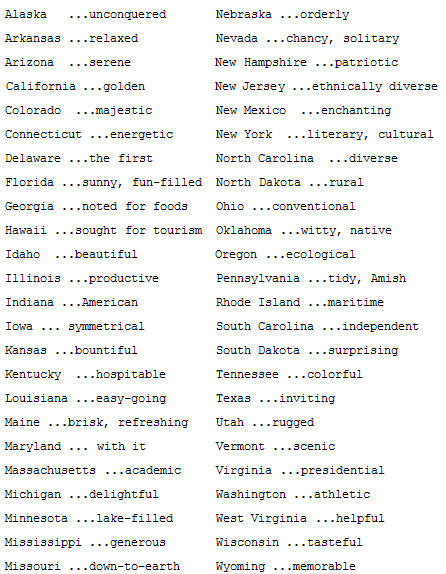
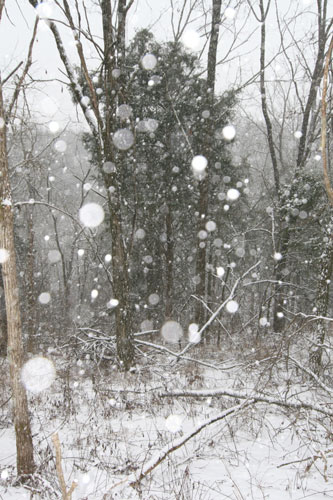
Early December snow in Kentucky
(*photo
credit)
December
6, 2009 Prepare the Way of the Lord
We are called to be
road and bridge builders, and thus are answering the command to
serve others. We do not literally straighten the highway curves,
though some of our Appalachian roadways could benefit. Rather, we
are called to help straighten the spiritual and social conditions on
all levels of community and citizen action. John the Baptist, the
true simple living person, was most forthright and open about what
needed to be done in his day. We are called to show the same
determination in addressing the addictions of our people to drugs
and consumer products.
Individually, we must discipline our lives, much as did the simple
living John the Baptist. We find Advent as well as Lent to be
periods to control our appetites and build our resistance to the
world's allurements. The Lord wants us to be able to say "yes" to
God, and to say "no" to such distractions as drugs and consumer
luxuries. Such straight talk is achieved through self-sacrifice.
Our culture hardly believes in sack cloth and ashes, but it ought to
look behind the symbols. Instead of expensive wardrobes and gifts
expected for Christmas, we ought to prepare ourselves through
fasting and self-denial, through living more simply, and through
encouraging others to do the same.
Regionally, we must confront the problems facing our communities,
whether these be heavy drug use, lack of employment opportunities,
or destruction of our environment through overuse of resources in
our individual and collective lives. People feel disconnected, and
they need to regain a sense of community through joint activities
and programs to enhance their family's well-being.
Nationally, we need fiscal responsibility as well as proper caring
for the health of all the people. As mentioned on December 2, we
must address the cultural expectations of an economy based on
consumption of goods, and transform that into one of a service
economy. We must encourage fair taxes and accept strict regulation
of the greedy moneychangers in our Wall Street temples.
Internationally, the world's people must begin to feed those who
are hungry, and support those who need spiritual guidance. Most of
the problems facing our world would be addressed, if those who are
privileged were to contribute to those who do not have enough. We
learn from John the Baptist's proclamations that the act of
straightening out the crooked ways is a public act, something in
which we all can participate. John and later Jesus had the courage
to face up to this immense opposition at the cost of their own
lives. Why in this upcoming season of peace, tranquility, and
friendliness bring up such pressing problems as individual
restraint, regional awakening to drugs, caring for resources and
assaulting ongoing privilege? The reason is that preparing the way
means helping to establish justice for all.
Prayer: Lord, You
prepared a people for the Messiah's coming; prepare us to be
co-preparers of the New Heaven and new Earth.

An old appliance, in need of inspection before
use
(Frank Lloyd Wright's Rosenbaum Home)
(*photo
credit)
December
7, 2009 Ensure Fire Safety
Fire Safety Day allows us to recheck on everything so that
our upcoming holidays will be safe and more joyous ones. We know
that before this month ends some tragic accident or fire will appear
in the news and involve merrymakers. Well in advance of the
celebrations let's ask ourselves some basic questions so that
dangers can be uncovered and fixed before the guests arrive:
* General interior safety -- Do you have an early warning
system in place in case of fire -- alarms, numbers to call,
serviceable fire extinguishers? Is there a fire screen when an open
fireplace is used for cozy fires in this winter season?
* General exterior safety -- Have the chimney and flues been
checked this year? Do you compost and refrain from burning garden
or home-generated wastes that cannot be recycled in other ways? Is
the house equipped with lightning rods? Is there cleared space from
which combustible brush and thatch have been removed? What about
leaves in the hidden places of the yard?
* Home decorations -- Do you decorate with materials that
are not easily combustible? Is there a fire safety consideration in
selection of ornamentals? Are exterior strings of lights properly
hooked to the system?
* Festive practices -- Are all lit candles attended to at
all times? Do you refrain from lighting candles on Christmas trees
or near potentially flammable evergreen decorations? Do you omit
the use of fireworks in the home environment -- and leave that to
the officials who are trained for such displays?
* Home safety regulations -- Do you forbid smoking of
tobacco or marijuana on the premises, and realize that cigarette
paper is made to burn well, something like a dynamite fuse? Do you
have exit routes thought out in advance, and all residents aware of
how to open windows and exit the building?
* Internal safety measures -- Is access to matches difficult
if infants are around? Do any of the appliances malfunction or
spark when used? Are any of the circuits overloaded? Have electric
safety plugs been installed especially near water sources in bath
room and kitchen?
* Kitchen safety -- Are you aware that many house fires
relate to cooking? Is combustible oil handled properly near hot
surfaces? Are paper towels kept at a distance from hot
surfaces? Do you have sufficient heat pads and gloves?
Prayer: Lord, You
gave us fire to keep us warm and to cook food. Allow us to foster a
sense of care for the safety of all residents and visitors, and to
treat our gift of fire with respect.
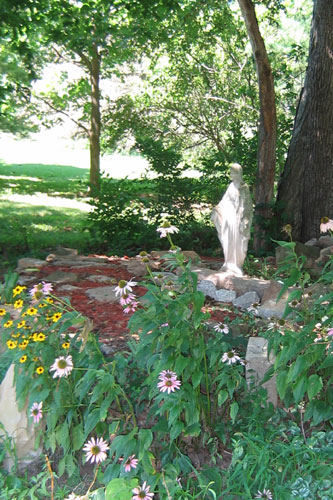
Mary in the garden, Cane Ridge Meeting House (KY)
(*photo
credit)
December
8, 2009 Proclaim Mary -- Mother of Earth
He went in and said to her, "Rejoice, so highly favored!
The Lord is with you."
(Luke 1:28)
If fragile Earth is dear to us, we must show devotion by
protecting her. If one must be humble when close to humus Earth, so
those who are most humble are the ones more down-to-Earth. If we
are all blessed by being close to Earth, she who mothered the One
coming down to Earth, nurtures and "mothers" Earth herself. Why set
Mary on a pedestal, for her role is one of service on this Earth --
and she needs to be closer?
From the beginning of creation Mary was special in the mind of
God; throughout the long course of salvation history Mary had a
preparatory role, which she discovered as a young lady of her
culture, which included the longing of Chosen People for the
Messiah's coming. Furthermore, she was down-to-earth in her manner
of life: her counter response to Eve's "no" to God's command to
abstain from the Tree of the Knowledge of Good and Evil (Genesis 3);
her helping to create a new Garden of Eden by a "yes," Let it be
done according to God's wish; her deep reflecting on things in
her heart; her allowing her son to leave home on his mission; her
times of happiness, sorrow, apprehension and joy; her standing at
the foot of the cross; and her presence at Pentecost. Because she is
willing to trust even though she does not fully understand, she is
truly the mother of all the living and of all people of hope. She
is filled with the Holy Spirit, who inspires and remains with her.
She is taken into heaven ahead of us.
If Mary finds favor with God, so should we who seek to be in
divine favor. By assisting in protecting Earth we also bring
salvation to it -- just as by her "fiat" Mary did two millennia
ago. As members of the divine family through baptism, we
participate in healing Earth with Mary even though she has been very
highly favored:
* We were in the minds of God from all eternity;
* We bear the traces of the faith of our ancestors who lived, hoped
and trusted in God to keep their offspring in the faith;
* We were immaculately conceived into the Body of Christ at baptism
-- though we do not remain so due to our imperfections;
* We await the coming of the Lord into our lives as Jesus comes to
each of us in the sacraments;
* We bear Christ to others as part of our mission in life amid joy,
sorrow and troubles;
* We take risks and trust God's grace on our journey of faith;
* We are thrust into the cosmic struggle of good and evil;
* and we beg for the transparency of Mary to look ahead to a New
Heaven and New Earth.
Prayer: Lord help us
to see that just as Mary is totally open and transparent in her
radiant being, so we need to see our mission to enter with her into
the role of healing our wounded Earth.
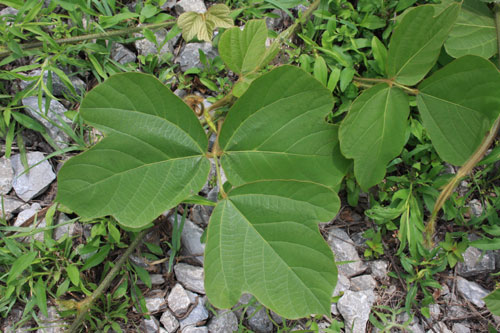
Leaves of the kudzu plant, Lincoln Co., KY
(*photo
credit)
December
9, 2009 Recognize Kudzu in Our Midst
Kudzu
does not conjure up pleasant memories in the southeastern United
States; however, in Japan, the country of origin, the plant is
regarded with respect. Why the difference? The Japanese regard
this as a native species that when properly controlled has many good
uses as food and feed and fiber. However, in the United States the
introduction and cultivation was terribly mishandled -- and kudzu
has gone wild. All parties agree that kudzu has many good
properties that led to its U.S. introduction: its easy adaptation
and vegetative proliferation as potential livestock feed. However,
traditional Japanese control techniques of careful cultivation were
foreign to Americans.
Kudzu (Pueraria lobata) arrived in our Southland from Japan
at the New Orleans Exposition in 1884; it was seen as an exotic
ornamental with sweet smelling flowers and lush foliage. By the
turn of the 20th century, a southern agricultural association was
promoting it as a fodder for cattle. In 1927, a Georgia promoter
declared, "Cotton isn't king here anymore; kudzu is king." By 1934
the U.S Soil Conservation Service had introduced this plant as a
species for use in eroded ravines and for reclaiming road and
railroad cuts. About that time academic research at the University
of Georgia found hormones to make kudzu grow faster. After the
Second World War, the truth began to dawn: kudzu was an uncontrolled
menace, growing rapidly beyond intended areas, climbing over
buildings and large trees. This exotic species was an invasive. By
1993 the cost of fighting kudzu was estimated at $50 million
annually. (Reference: Kurt E. Kinbacher, "The Tangled Story of
Kudzu," in Auburn University's The Vulcan Historical Review,
Volume 4, Spring, 2000.) Now it is double that amount.
Granted kudzu has benefits. It has a potential to support
bioremediation efforts to regenerate the fertility of
nutrient-depleted soils. As a legume it has a symbiotic
relationship with Rhizobium and can fix nitrogen in soils.
Besides, kudzu is a green manure, will out-compete weeds, returns
nutrients and biomass to soil, and makes a fine mulch and an animal
fodder comparable nutritionally to clover and alfalfa; the plant is
rich in vitamins A, D, calcium and protein. The uncontrolled
proliferation of kudzu was only gradually recognized because the
Japanese saw no control problems. Thus America's first revegetation
efforts became a miserable failure. As a postscript, kudzu is now
an invasive exotic species choking out native species throughout the
Southeast. It covers over 7,000,000 acres of land, or equivalent to
that of Maryland. Some eradicate the pest using chemical
herbicides. Newt Hardie of Spartanburg, South Carolina uses
volunteers to spread sheets of thick clear plastic as a defoliant,
and then attacks the root crowns with pruning saws and hand plows, a
process considered seriously by the U.S. Department of Agriculture.
Prayer: Lord, teach
us to be responsible in introducing
exotic species, to test them before widespread introduction, and to
respect the native species with which they will coexist.

Morning sun rises on a December day
(*photo
credit)
December
10, 2009 Participate in Human Rights Day
On Human Rights Day let's think of how meaningful the day is
to us -- who may regard all the human rights as possessed. First,
we participate by seeing the wrongdoing at a distance, calling for a
halt and for the beginning of forgiveness, and enter as a community
of the hurt to enhance human rights. Our participation follows the
three levels of humility by St. Ignatius of Loyola.
A first level of participation is seeing that wrongdoing
has occurred, and that this requires initiation of the process of
forgiveness. We know others are being hurt and "they," though
separate from us, need our help even while at a distance for lack of
close kinship. We speak out for them by exposing wrongdoing and
calling for change, because current conditions cannot be tolerated.
Reconciliation needs to occur, not between culprit and we as
observers, but between culprit and victim; this involves the set of
past circumstances becoming present to us. The act of hostility
must be pointed out and required to cease in whatever manner
possible by enlisting the help of others (whether a personal quarrel
or an international human rights abuse case).
A
second level is
recognizing that distance hinders full reconciliation. Standing
apart from the culprit and victim is part of the problem. Therefore
we close the distance and halt the wrongdoing to the degree that we
can; we call to the victim to begin the forgiving process. Our own
reluctance to become party is part of the dysfunction resulting from
the cumulative social effects of wrongdoing. The human family has
been hurt, and our strained relations do not allow us to be
identified yet with the victim; we only speak up for and to the
victim to initiate the healing process. From the existing distance
we call upon local wrongdoers to stop beating their spouses or
disturbing the peace of the community. We enter a situation
deserving change, but do so reluctantly. Unease makes us see that
observation is not enough. We are part of the problem and must
forgive ourselves in order to be a true party in reconciliation.
The third and deepest level is to become at-one with the
other parties in creating a better future. Forgiveness is not
forgetfulness; it does not overlook the wrongful action and thereby,
implicitly, condone the wrongdoing that has occurred. "We forgive"
means a forming of community between we (observer, victim and
culprit). All are hurt; all are needing reconciliation as friends.
If the person who is doing a wrongful action or omitting doing a
rightful duty, is a relative, acquaintance or collaborator, it
becomes more obvious why we must speak. As part of the "we" in the
process, we come closer and enter into the reconciliation process as
friend to the one hurt and also to the one hurting. Thus at this
deepest level of reconciliation the entire human family is involved.
Prayer: Lord, make
us true peacemakers in helping others gain their own human rights
whether in our backyard or at a distance.

Christmas fern (Polystichum acrostichoides)
on forest floor
(*photo
credit)
December
11, 2009 Contest
Urban Sprawl
Several times a month I drive through urbanized Madison County,
Kentucky, on the way to Lexington. This county, including the towns
of Richmond and Berea along with Eastern State University, is one of
the fastest growing in the state. Literally hundreds of acres of
formerly highly productive farmland are being scraped and bulldozed
into new housing, commercial establishments, and suburban roadways.
For idyllic landscape lovers, it is not a pretty sight. Some of us
may remember pictures of or actual visits to European cities with
neat divisions made between what is urban and what is rural. With
proper planning and building regulations, much of Europe lacks the
sprawl found here in Madison County and elsewhere in America. In
fact, some speak of urban sprawl as threatening some of America's
prime farmland.
American urban sprawl is due to use of private automobiles and
relatively cheap fuel for commuting, to the status of owning
greenspace, to the desire to escape congestion, and to the quest for
open space and fresh air. Deeper causes include the unfettered
activity of real estate developers and the lack of zoning and land
use regulations. Kentucky hurts, for it loses over one hundred
acres of farmland each day. Because of its relatively small size --
Kentucky is thirty-fifth in area -- the state is heavily impacted
from this undirected sprawling of city into countryside. In Mason
County, Kentucky, where I was born, the once beautiful rural
countryside near my homeplace is now overdeveloped with scattered
housing -- and that in areas containing modest farms in the 1940s.
However, it is comforting to see that some very marginal farmland is
being utilized by establishments bordering the recent, limited
access AA Highway, running through that familiar countryside of
younger years. Change occurs and we can do little about it.
Sprawl not only pollutes the scenic view but consumes prime
farmland, only some of which can still be used as backyard gardens.
One map by the American Farmland Trust shows large patches of the
United States with prime farmland and heavy development. In fact,
if the trend continues in our Bluegrass State, the tourist
attraction of landscape charm will be lost along with its associated
business. Traditional farming ultimately loses in the development
battle. Leapfrogging (creating idle land between new developments)
isolates traditional rural communities, raises land prices, results
in more trespassing on land and therefore crop damage, and creates
opposition to such farm practices as manure spreading. Sprawl can
be checked through proper types of zoning and land use regulations,
which gain favor as citizens see the need to retain open undeveloped
space. Proper planning is needed to preserve the character of the
landscape -- but it takes community effort to achieve modest
results. It must be said that more costly fuel along with a desire
to cut commuting time, has made a return to central city urban
living an attractive alternative.
Prayer: Lord, teach
us to respect our land and to see beauty
in proper planning and use of our precious greenspace.
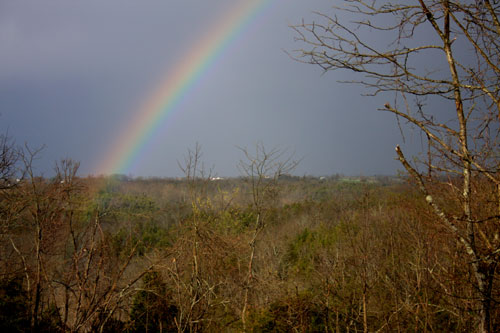
Vivid rainbow after a rain shower on a December
day
(*photo
credit)
December
12, 2009 Make This a Peace Celebration Day
How can we celebrate peace when this nation is engaged in two
wars? A ministry of thanksgiving directs us to show appreciation
where we can for the gifts God gives us -- and peace is one of these
gifts. It is important to find peacemaking elements within our
world, to recognize them and to work to improve them. We celebrate
the following:
* The peace within, consisting of the peace God gives us for
striving to do what is right. Over and over in the Sacred Liturgy
we say, "Peace be with you." Thank heavens for this peace
experienced by many people.
* United Nations peacekeepers, and the UN commitment
to bringing about peace in this war-torn world. What would it be
like without such an international body?
* Church leaders who seek to bring about a reconciliation
among peoples who have distrust, and who belittle or persecute
others. Interfaith accord is a way to peace
* International relief organizations who administer to the
hungry and oppressed, and help small farmers in developing lands.
* Our American peacekeepers who work in the Middle
East, North Korea, the Balkans, parts of Africa and in all places
where discord is occurring. Where our military acts as caregivers
in regions afflicted by natural and human-caused disasters we have
ever reason to be grateful.
* Governmental peacemakers at all levels of governance from
local to national. Police and many others give a service that is
peace-making in nature, and they deserve to be thanked and
appreciated.
* Peace organizations committed to confronting our warlike
attitudes, to challenging obscene military budgets of this and other
industrialized nations, and pointing out the utter futility of armed
conflict.
* Individual peacemakers within families and communities who
try hard to bring about reconciliation among warring parties.
Blessed are the peacemakers for they deserve all the support that
they can receive. They exude hope that the world can be a new and
more peaceful place, where earthhealing may occur undeterred by
threats of war and friction.
Prayer: Lord, at
this season we celebrate the coming of the Prince of Peace into a
world that is growing extremely tired of terrorist threats and
warlike behavior. We know that a truly peaceful world is a miracle,
so help us Lord to believe in this miracle of lasting peace. Give
us the grace to do our part.
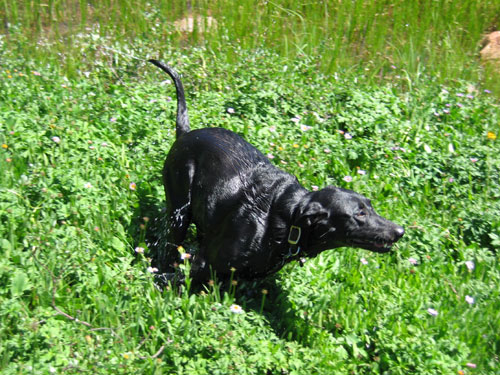
A young pup romps in a favorite swamp, a sincere
expression of joy
(*photo
credit)
December
13, 2009
Rejoice in the Lord Always.
(Phil. 4:4)
In mid-Advent we anticipate the joy of Christmas on this Gaudete
(joyful) Sunday; we know with certainty that Jesus has
already come; we now await his Second Coming with eagerness. Paul
encourages us to fill our thanksgiving with the joy of the Christ
who is with us. Zephaniah says that we are to shout with joy and to
be glad and exult with all our hearts. (Zeph. 3:14-18) Our sorrows
and troubles are only temporary, and it is joy that fills our hearts
at all times and gives us a hint as to how we are to conduct
ourselves in this passing world. We need to ...
* be always joyful, for our salvation is at hand and we have
Christ present with us. Long-term sadness has no place in our
lives;
* never cease praying, for we have so much to be thankful
for in our world;
* striving to heal others, for then we can imitate the
Christ who came here to heal the brokenhearted; and
* hear the words of John the Baptist, "Whoever has two
cloaks should share with the person who has none. And whoever has
food should do likewise." (Luke 3:10-18)
At the Seattle Special Olympics, nine contestants, all
physically or mentally disabled, assembled at the starting line for
the 100-yard dash. At the gun, they all started out, not exactly in
a dash, but with a relish to run the race to the finish and win.
But one little boy stumbled on the asphalt, tumbled over a couple of
times, and began to cry. The other eight heard the boy cry. They
slowed down and looked back. Then they all turned around and went
back...everyone of them, One girl with Down's Syndrome bent down
and kissed him and said, "This will make it better." Then all nine
linked arms and walked together to the finish line.
Everyone in the stadium stood, the cheering went on for several
minutes. People who were there are still telling the story! Why?
Because deep down we know that what matters in this life is more
than winning for ourselves. What matters in this life is helping
others win, even if it means slowing down and changing our course.
(Email from Betty
Henschen to Dick & Martha Lammers and shared at Christmas, 2005.)
What is amazing about this brief story is that it is an example of
people who run with joy, pray through their playful activity, are
acutely attentive to the needs of others, and who share their
radical giving by walking arm-in-arm with those who are the most
vulnerable. Rejoice, for here is an instance where those of sincere
heart are able to teach the rest of us who strive to live in a
wounded and overly competitive world.
Prayer: Lord, help
us to express our joy in public ways, to help it spread to others,
and to make it contagious.

A "mad" song sparrow (read the story of the "Mad
Bluebird")
(*photo by Sally
Ramsdell)
December
14, 2009 Become Friends with Wintering Birds
According to tradition, the current Halcyon period refers to
a legendary bird, identified with a kingfisher; this bird is
supposed to have a peaceful and calming influence on the sea at the
time of the winter solstice -- during its brooding season in
floating nests at sea. The calm season is like American "Indian
Summer," or a short period before winter storms arrive in earnest.
The birds you see now remind us landlubbers that we have
non-migratory birds willing to endure our winters; these have a
similar calming effect on all of us permanent residents who must
endure the coming winter. Our colorful migratory species have moved
to warmer climates just as some of our Florida-bound retires have.
The hardy birds remain and serve us as companions, and their
presence helps calm our nerves.
Someone asked me whether I know all the birds that are the
permanent residents near my residence. Well, they include the jays,
crows, hawks, cardinals, buzzards, wrens, owls, and some geese --
but there are undoubtedly more. Their darting about, their small
twitters and tweaks, and their willingness just to remain and try to
make it through the winter gives us hope we can survive as well.
They are here and they delight us, if we only look out and notice
them.
Today the official bird count by the Audubon Society folks starts,
in order to ascertain the bird frequency in number and locations.
There's a special methodology used by experienced bird counters.
However, if you are a compulsive counter and birdwatcher, there's
nothing wrong with engaging in the count and with time becoming
professional about it. I like to count hawks while speeding down
the major roadways, but this practice can be dangerously distracting
if taken too seriously.
Some naturalists would argue that winter birds do fine on their
own, even though their pickings are far more sparse than in summer.
I have noted that the holly tree with its red berries outside the
window is suddenly attacked by a flock of birds in mid-winter, and
they consume all the fruit in a matter of minutes. The same
phenomenon was noted on the neighbor's persimmon tree, where the
ripe fruit was consumed by another flock of blackbirds in a matter
of minutes as well. The winter birds seem to like feasting
together, maybe a form of communal action practiced in times of
scarcity. Perhaps the current assaults on the environment require a
certain flexibility on our part; we need to feed birds simply to
keep our friends healthy through the winter months.
Prayer: Lord, be
kind to the winter wildlife, for times are becoming more challenging
for them. Show them compassion, for they becalm us, make us feel
secure and allow us to be more sensitive to all creation, especially
the more vulnerable flora and fauna.
Inspire us to share our bounty with the wildlife.
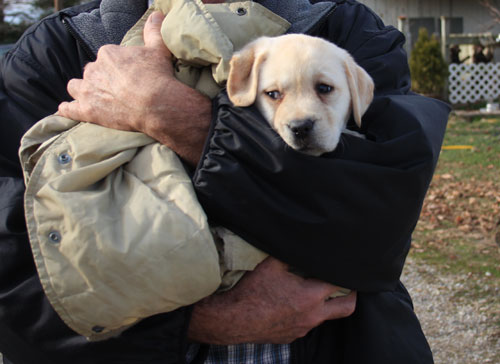
Cisco, a new puppy to help ease winter'c chill
(*photo
credit)
December
15, 2009 Remember FDR and a Second Bill of Rights
On Bill of Rights Day we ought to see that the original ten
amendments to our U.S. constitutions were both set in stone and
erected with enough space to permit further additions. Human rights
are not to be shaved down or eliminated, but rather expanded to
include other rights not considered in the past. We are called to
protect vigilantly the enunciated rights put forth by the
Constitution's framers and other rights that we become aware of
through the years. Also our duties and responsibilities expand
accordingly.
Martin Moore in Capitalism: A Love Story concludes with a
talk by President Franklin D. Roosevelt, who called for a second
Bill of Rights to include such things as the right to a job and
proper health care. The thoughts FDR presented near the end of his
life were accepted by other nations and became part of their social
fabric, but not that of this country. The challenge before us on
this Bill of Rights Day is to make explicit the rights to all
people, not privileges to a chosen few.
Rights related to the sacredness of the human person:
* to life
* to free speech
* to freedom of the press
* to the redress of crimes and offenses
* to freedom of religion and manner of worship
Rights related to basic necessities and global commons:
* To clean air
* To potable water
* To nutritious food
* To clothing for warmth and decent appearance
* To shelter for security, protection from the elements
without fear of foreclosure
* To fuel for cooking and warmth
Rights related to a citizen's quality of life:
* To a job and to have meaningful employment
* To literacy and freedom to transact business
* To health facilities and protection
* To fair taxes and clean government
* to the chance to vote and to help determine government
* To mobility in traveling freely from place to place
* To proper police protection
* To jury by peers
* To Internet and global communications
(Finland recently made fast Internet a right)
* To access to cultural heritages
Prayer: Give us the
courage, Lord, to expose and defend our basic rights, and to curb
the privileges that strive to limits these rights. Help us to
impress on others the duties that come
with acknowledgment of rights.
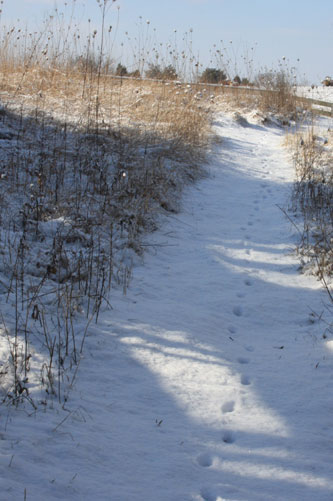
Snowy footprints on a cold December day
(*photo
credit)
December
16, 2009 Promote Good Reclamation Practice
Healing our wounded Earth includes the therapy of proper
reclamation practices, though publication of the total hidden costs
of fossil fuel extraction would skew the industry faster to
renewables. We noted on December 9 that kudzu was once regarded as
a healer for roadcuts, but proved to be a technical tragedy in our
country. The multiflora rose, a native of Asia, was originally
brought to the United States in the 1800s for use as rootstock for
grafted ornamental roses. Through the 1930s and into the 1950s,
this exotic was promoted by the U.S. Department of Agriculture as a
"living fence" for windbreaks and erosion control. Birds enjoy the
rose hips, and thus spread the plant to a wide array of climatic and
soil conditions through their random droppings. This seemingly
harmless rose is quite capable of choking out native plant life
though persistent mowing can rid lands of the pest. Likewise the
invasive tree of heaven is found now throughout central Appalachia
in sunny, disturbed areas and wastelands. Japanese honeysuckle was
propagated in America for landscaping and erosion control. We know
its aromatic fragrance, but it is as bothersome as its bushy cousin
coral honeysuckle.
The similar choice of invasive and exotic species such as autumn
and Russian olives for areas disturbed by surface mining has also
proved to be unwise. These shrubs, which can reach twenty feet in
height, were planted to control erosion, return nitrogen to the
soil, and provide food for wildlife. Birds enjoy the abundant small
red drupes that mature in early autumn; they scatter seeds,
contributing to making these species worrisome invasives that
compete for open well-drained land. These two tree species luckily
are not shade tolerant and will not spread in already heavy forest
cover. To eradicate them requires repeated mowing and grubbing out
the entire root system.
In the past, a cut-over forest would include many saplings and much
understory growth, which could spring back rather rapidly following
the axe-wielding loggers and oxen. As the disturbance process
continued with greater severity into the past century using heavier
machinery and reaching wider areas, disturbances became more
pronounced and resulted in flooding and erosion; the ability of
native vegetation to return was stifled. However, better
reclamation efforts were developed and federal reclamation
regulations were introduced in the latter twentieth century to
address poor reclamation practices. Just as the original damage to
the landscape was done with disregard to ecological principles, so
better selection of reclamation species is important. Better plant
selection is not everything; quite often, the land must be
prepared, properly drained, fertilized, planted, thinned, and
protected so that the more natural succession of species will
result. All these operations cut into profits.
Prayer: Lord, give us the courage to demand that proper
reclamation practices accompany disturbances of our fragile Earth.
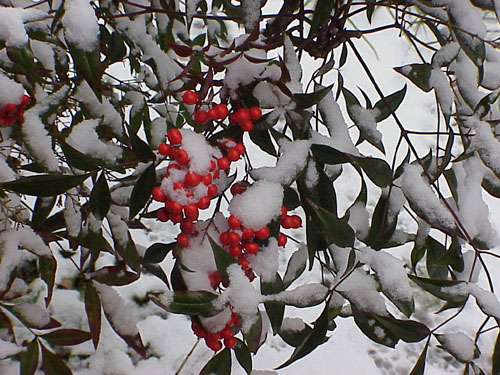
Nandina berries on first snow of 2009, Estill
Co., KY
(*
photo by Sally Ramsdell)
December
17, 20099
Fly on Wright Brothers Day?
Throughout the twentieth century many of us thought riding in an
airplane was the thing to do. However the second century of
aviation brought in a number of factors that took the glamour out of
this practice: standing in line, searches and shoe removal at
airport inspection points; congestion and the flow of humanity
boarding and deplaning; noise on approaching and leaving aircraft;
ticket counter encounters; airline delays and flight changes;
cramped seating arrangements and the next passenger using a cell
phone and taking up your space, and on and on. Airports take up
immense amounts of urban land; parking is hard to find and sometimes
we forget where the car is parked. The plane can carry a person to
receive health care and it can carry a sick person and help spread a
plague. Are these little or big concerns?
However, amid the inconveniences just mentioned we get to places
faster through using the airplane. Flying is more than exciting and
exhilarating. For the long distance traveler, flying beats other
forms of travel such as the stage coach and the sailing ships of
yesteryear. The flying experience itself can be a welcome moment in
our lives; looking out the window as the landscape below flows past
is a way of disconnecting with the concerns of everyday life. Upon
arrival and stepping of the plane we pause for a moment of rare
thanks that we had no mishap. We know many good things about
flying: mercy flights with humanitarian relief, the Berlin Airlift,
search missions after human-made and natural disaster, and rapid
travel for business or emergencies. Consider the marvelous work of
helicopters, which can pluck stranded people off rooftops in floods
or rush them to hospitals from remote places.
For better or worse, we are flying people. Counterpoise those
benefits just mentioned with the horror of a screaming fighter plane
strafing innocent refugees in the Second World War. Think of the
bomber carrying the atomic bomb over Nagasaki or Hiroshima, or the
terrorist commandeering a passenger plane and sending it into the
Twin Towers with many innocent people aboard. Think about the crop
duster killing mosquitoes or the one adding chemicals to the food
crops and harming farm workers. What about the considerable fuel
costs and air pollution involved in air travel? Faster ground
transport could replace half of those flights and even get people
closer to their destination with ease. Think of the time it takes
to get to an airport, park, pass through inspection, wait, board,
fly, disembark, and take the local trip to the destination. However,
getting across the ocean more quickly has many advantages. Maybe
flying is a good thing when done infrequently and in moderation.
Prayer:: Lord teach
us to recognize that the Wright brothers ushered in a technology
that went far beyond their wildest dreams. Show us our duty to
ensure that this rapid mode of transportation is used properly and
adds to the healing of the Earth; help us to discern when to fly and
when to use ground means.
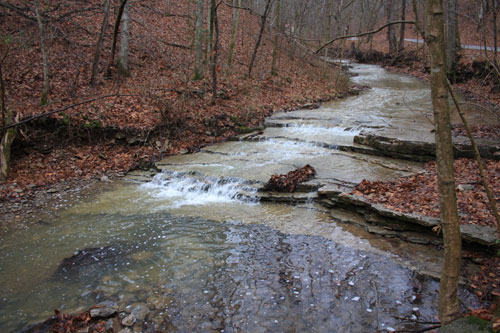
Rushing creek after December rain
(*photo
credit)
December
18, 2009 Appreciate Sacajawea Day
Sacajawea, the Native American woman who accompanied the Lewis and
Clark expedition in the early 19th century, may have been America's
most unappreciated person. She carried and bore her child and
nursed the infant while traveling in some of the harshest of
conditions; she connected with other Native Americans in the vast
lands which were traversed and acted as translator; and she became
the valuable intermediary and guide for the historic expedition that
tied our nation from coast to coast. Without her the project would
not have been successful. However, she was simply dismissed at the
end of the expedition with little fanfare and virtually no
compensation for the work performed. Yes, we now have a dollar coin
that bears her image, but it is a little late, isn't it?
As this Christmas season approaches, it is fitting to probe our
memories, experiences and records for unappreciated people in our
lives and within our local communities. Many people do valuable
services for which they receive little or no compensation; they are
taken for granted, and sort of overlooked for those who boldly step
out in front and take credit for things they did not do alone. The
overlooked certainly should not be simply dismissed with little
else. They do not come to mind quickly, because we all are inclined
to overlook others. It's hard to furnish a name because by
definition they are the unappreciated; these rise from this category
upon being recognized for what they do.
We need to be sensitive to all who contribute to society. They
stop traffic for school children, pick up litter off the street, are
quiet caregivers to loved ones; they run errands for the shut-ins;
they cook and sell tickets and wait on us without us even looking up
to see their faces. It is time we look up, let our eyes meet
theirs, nod a gesture of gratitude, and add a kind word. This
sensitivity or lack of it is highly tied to our concepts of
privilege, namely, that we deserve the services of others, for we
are paying for them. However, in the long run we do not deserve
these blessings. Appreciation goes hand-in-hand with gratitude;
when we become more thankful for gifts received, we begin to notice
the hands and persons who deliver these gifts to us.
Much of this lack of appreciation results from our failure to slow
down, to see others in our midst, and to take a moment to look
around at the invisible people who are all about. Does it take
their death to appreciate them? Or does it take the careful detail
of history to discover a Sacajawea -- or for that matter the entire
Native American culture -- of which she was an unappreciated part?
We tend to translate history into the feats of the mighty and the
strong, and to forget that it takes many, including the forgotten
supporters to give history its true meaning. Appreciating history
then includes giving recognition to followers as well as leaders.
Prayer:: The Lord is
coming; let us appreciate this event and show our gratitude by
saying "thanks" a little more often.
The Lord is
coming; let us appreciate this event and show our gratitude by
saying "thanks" a little more often.
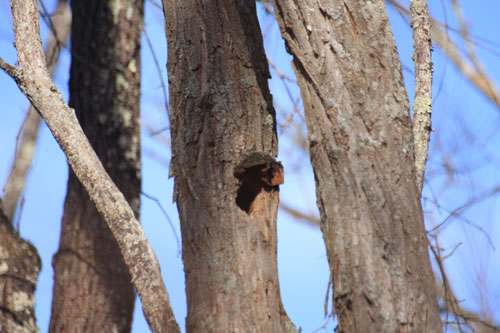
Tree cavity with natural "awning"
(*photo
credit)
December
19, 2009 Show the Death Penalty is Not Pro-life
It always mystified me that some who pride themselves on being
"Pro-life" would still desire that criminals face capital
punishment. It is far more holistic to respect the life of ALL
human beings, whether in the womb or beyond, whether in the cancer
ward or on death row. Furthermore this respect should extend to
other creatures (flora and fauna) of the Earth as well. We do not
destroy animals for the fun of it, but in some cases animal life
must be sacrificed so that we can stay alive. We respect all of the
precious creatures striving to live out their days.
Some who call themselves pro-life limit the extent of "pro" and
seem to dehumanize certain criminals. This segment of the pro-life
community will overlook the life of a prisoner on death row but will
defend the human fetus. This inconsistency greatly weakens the
cause for life and a pro-life stance. Whereas at least half of
Americans would say they are in the pro-life camp, a far smaller
fraction of that population desires to abolish the death penalty.
However, in all fairness, that minority is growing with the years,
for the accepted cruelties of the past (hanging, drawing and
quartering, beheading and crucifixion) are no longer accepted means
of putting people to death.
The death penalty has been abolished in half the nations, including
the more civilized countries -- in Latin America, Great Britain,
Australia, New Zealand, Canada, South Africa, France, Germany,
Italy, and Denmark. The first countries to abolish the death
penalty were Venezuela (1863), San Marino (1865) and Costa Rico
(1877). An increasing number of countries will not even extradite a
criminal to the United States, if there is a chance the trial would
result in the death penalty. At least thirteen U.S. states have now
abolished the death penalty: Alaska, Hawaii, Iowa, Maine,
Massachusetts, Michigan, Minnesota, New Jersey, New Mexico, North
Dakota, Rhode Island, West Virginia and Wisconsin -- and Maryland is
now being added. Several others are for all practical purposes not
implementing death penalty statutes. Furthermore, American
citizens see the death penalty as inconsistent with the enlightened
age in which we live. Going to a public hanging may have been
entertainment a century ago but not now. Besides, in these hard
times, statistics show that those on death row are very expensive to
process and maintain.
Executing an innocent person is utter tragedy. After investigation
using modern DNA testing methods, a number of prisoners on death row
are proven innocent, causing a recent governor of Illinois to call a
moratorium on executions. Why not give all criminals the
life-giving opportunity to make restitution? What a horror are
families of victims who delight in execution. It is double
victimhood! The prisoners' restitution and opportunity to repay
society in some way are far more humane and pro-life.
Prayer:: Lord, teach
us to see life as precious in all aspects.
Lord, teach
us to see life as precious in all aspects.

Sighting in Corbin, KY shop window
(*photo
credit)
December
20, 2009 Blessed Are You Among Women
Women are usually the last to benefit from increasing income
[but] they are usually the first to make sacrifices when the
financial situation deteriorates. The UN Standing Committee on
Nutrition, 2009.
As we approach Christmas, we should remember that one mother had a
key role to play in the sacred event we are about to celebrate. God
enters into our history in a special way through the womb of a
humble virgin, who becomes the God bearer, Theotokos. The
days before Christmas are a special time for us to reflect upon the
conditions necessary for successful birthing, and how adequate
resources must be made available throughout the world so that these
births may occur in a safe and healthy manner. Too many women lack
pre-natal care; too many women die at childbirth; too many children
enter life through unhealthy conditions. There are reported to be
fifty million anemic expectant mothers and one billion malnourished
and destitute women and children, thousands of whom die each day
from hunger and lack of proper health care.
These sobering facts make us reach out and give a special blessing
to expectant mothers, and rightly so; social justice demands that we
do so. Part of this blessing is to help provide the care that is
needed for a successful birth. Mothers' proper care and nutrition,
as well as their sense of hope in the expectant child's future, have
a social dimension just as Mary's motherhood was a cosmic event two
millennia ago. Successful birthing of all women adds to the health
of our Earth herself. We need a gentle mother's touch to keep this
world on an even keel; we need to see a mother's act of giving
birth as a social event, a bringing a new member of our human family
into the fullness of a safe home situation. Thus motherhood is more
than individual; it has a social dimension involving us all: the
mother's health and well-being in the child-bearing period, her
birthing, and her ability to make the home a quality place for the
child's upbringing.
Mary's unique womanly role is something only women can play.
Perhaps within Mary's affirmation to be a mother is found the unique
gender role that brings about the healing of our wounded Earth.
Mary's motherhood, is her partaking of a divine gift given to
females. Mary gives birth to Jesus. All women, especially mothers,
enter into this nurturing act, and the child-bearing role of birth
of each Christian, is when this is more clearly manifested. Truly,
not all women are mothers, but all women (and men) must help give
birth to a new world order. (See Special Issues "A Priest for
Equality Expanding View"). A mission as monumental as saving our
planet and changing our social order demands our global concern.
Making each and every child-bearing event a success takes all of us
working together as a concerned people.
Prayer: Lord, help
us to prepare for Christmas in a very special way, to see that
mothers everywhere have the health and
safety needed to bring their offspring to full term.
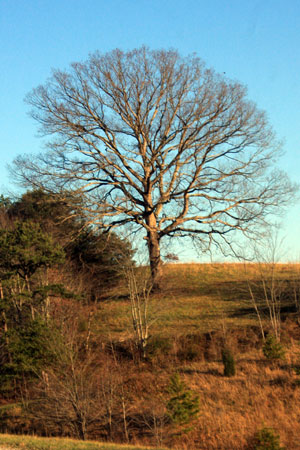
Stately old oak
(*photo
credit)
December
21, 2009 Welcome the Winter Solstice
In the northern hemisphere the winter
solstice is the darkest day of the year (very dark at the North
Pole and Arctic regions). Those of us who prefer not to drive at
night find that it takes extra planning to travel in the shortened
window of daylight. We "day people" have to search hard for the
benefits of this short light period. Actually the world needs a
certain amount of darkness for chemical reactions, decomposition,
nocturnal activity, and rest. Darkness is not something to be
fearful about, since we know that although it is of fifteen hours
daily duration, it has bottomed out -- something primitives of old
were fearful about. Rather for the next half of a year, light will
increase. Yes, the rest of winter lies ahead of us -- but at least
from now on each day will get a little longer. Furthermore, this
winter is the season of root growth and the stirring of new life,
which is fully expressed in the coming springtime.
Darkness is dispelled through light, whether
the light of the sun and heavenly bodies or through fire and
artificial lighting. Decorative candles are encouraged provided
they are placed away from combustible materials and attended to
during a given festive period. Throughout the winter and early
spring we return to festivities of light -- Christmas, Hanukkah,
Kwanzaa, Candlemas, and Holy Saturday to name but a few. On these
festive occasions we tend to light a single candle rather than to
curse the darkness. We appreciate the power of light to guide us
and to dispel darkness; and we find that people attract us who are
enlightened.
When a person in hospice care passes from
this world, the Appalachian people speak of "going to the light" as
a sign of new hope and life. We are more like moths than we care to
imagine; we are drawn to the light in our total physical/spiritual
being. All of us need light in order to remain healthy in both mind
and body. During this darkened season some people tend to lose
their energy and actually need additional full-spectrum sunlight in
order to allow the needed enzymes (and Vitamin D as well) to
flourish. Their physicians even advise them to obtain and use a
full-spectrum lamp for upwards of an hour or more a day.
Darkness is often equated with ignorance,
the condition of the unenlightened. Through light we receive
"insight," and thus can find a clear interior pathway to solving
problems. Furthermore, many make use of the long winter as a time
to focus attention away from the distractions of the outside world;
it is a time of study and reflection, for personal and community
enlightenment. The winter Solstice need not be a period of dread or
foreboding. It becomes a time of opportunity, a time when we
reaffirm our faith that the days will get longer, that we can endure
the darkness, and that there is the Light of the World at the end of
the tunnel. Spring will spring anew, and winter is its
introduction.
Prayer: Lord, allow
us to see this season as an opportunity to grow in the light
of grace.

Scenes from a Christmas hike
(*photo
credit)
December
22, 2009 Do Something Special at Christmas
God gives a special gift to us at this time
and we, in turn, must give something special to make this a
memorable period. Some suggestions are:
* Special attention -- See to it that
those who are foreigners or newcomers take part in American
Christmas festivities.
* Special words -- Express gratitude
for gifts given in prayerful thanksgiving to God, in attention to
those who do the ordinary services that are taken for granted, and
through talks, conversations, homilies and friendly greetings.
* Special feed -- Treat your pets or
nearby wildlife to something special to express the expanded
community of all beings.
* Special visit -- Give a special
visit to those in hospitals, prisons, or senior citizen places
during this holiday. Assist in delivery of gifts to those who are
often forgotten.
* Special events -- Try your hand and
voice at caroling. In many respects this is one of the best ways to
get into the Christmas spirit and help others do the same.
* Special help -- Volunteer to take
someone to Christmas Liturgy or other celebrations. Going yourself
is one thing; taking one who generally cannot or will not go is
another.
* Special rest period -- Be kind to
yourself and refrain from extra travel; just rest long in
preparation for Christmas.
* Special foods -- Make a change of
menu and eating habits. Today is the day to cook or treat others to
a special type of meal that you have not experienced during the
year. Is it to be Thai or Armenian or Alsatian or something else?
* Special service -- Visit those who
cannot have a family Christmas but will miss having one.
* Special reading -- Find an
environmental essay and read it carefully -- and resolve to help do
something about it.
* Special reuse -- Recycle one of
last year's gifts to another person; it may be your favorite gadget
or ornamental object, and that gives the gift special meaning.
* Special connection -- Look over the
mailing list and make a personal call to someone you overlooked this
past year. Make it a special Christmas treat.
Prayer: Lord, help
us to be of special service to others and to see this as a way to
give all we meet a deeper spiritual meaning of the Christmas
holidays.

Maple leaves collect winter snow
(*photo
credit)
December
23, 2009 Twas the Day before Christmas... and Panic
Yes, it's just before Christmas and all
through the house... panic is all about. There are gifts to
purchase and wrapping paper and extra food and fuel for the vehicle
and ... much to do on this last and most important shopping day
before Christmas. Panic is not allayed by encouraging one to write
a poem or a witty essay -- that time has long passed. Nor can one
bake cookies, make candy, construct a fancy birdhouse, or do a
million other things dreamed with time before Christmas. Here are
some shopper hints:
If
you must shop, do it
second-hand for good reason --
* Secondhand places are not as crowded as
are the Walmarts and the other markets of tacky new things fresh
from China;
* Secondhand items are most likely made in
America and of high quality;
* Without a pushing crowd there may be extra
precious moments to decide exactly how this or that gift fits the
needs and temperament of the recipient;
* It is ecologically more responsible not to
drain more resources required to manufacture a useless gadget from
scratch;
* It feels good not to give extra profits to
billionaires, but rather help keep a modest-income shopkeeper alive
and well;
* It allows one to shop without too much
shoppers' guilt, something that can destroy the spiritual nature of
Christmas;
* It relieves the stress of getting an
expensive item home and wrapped without breaking it; and
* It is inexpensive, but includes the
content of love so needed in this season.
If
you decide not to shop,
it is all the better to --
* Look for some of last year's gifts that
are unused and worthy of being recycled (but not to the giver);
* Ask neighbors whether they have secondhand
items that are worthy of being Christmas gifts;
* Wrap and give the book that you enjoyed
most this past year, and realize that as gift a little part of you
is given away;
* Consider some creative gift wrapping;
* Forget the food item and prepare something
creative with what is around the house;
* Prepare cards and tell your friends you
will pray for them;
* Just call and chat awhile and say that you
want to donate money saved from gifts to a favorite charity; and
* Take a break and get a nap, for the rest
will do you more good than burning the fuel to get to the secondhand
store; and
* Cook up extra and give to someone who
hates to cook, so there is extra for the guests who come to visit.
Prayer: Lord, quiet
my nerves and allow me a quiet moment that will do so much more than
busy work. Help me refrain from expensive gifts that can become
materialistic distractions from the true meaning of Christmas.

A dusting of snow on cedar branches
(*photo
credit)
December
24, 2009 Profess Our Creed through Deed
The Word became flesh -- an unfolding deed
in our midst. We in turn, are willing to do something (a deed)
through our professing of word (a creed). Christmas is the story of
the Word entering in a special way into human history. This is the
time when we solemnly profess that we are to help make history in
what we do in the service of the Lord. Our faith journey includes
the history of our worshipping forbearers, who helped bring us into
the world and nurtured our faith. Let's bear christ to others.
Thus a fuller understanding of the mysteries of our Faith involves
transforming inspired word into meaningful deed. In turn, by
reflecting on accomplished deed, we are better to spread the Good
News or sharing Word throughout the world.
Nicene Creed Inspired Deeds
1. We believe in one God, Expressing profound reverence in
the Father, the Almighty, all we do; refraining from
maker of heaven and earth... wasting any of Earth's
resources, for all created
things are good.
2. We believe in one Lord, Becoming other christs by openly
Jesus Christ, the only son spreading the word and working
of God eternally begotten... in harmony with our neighbors
through direct service.
3. by the power of the Holy Converting military programs into
Spirit he was born of the peacemaking and peace-keeping
Virgin Mary and became man... operations for the betterment
of all peoples.
4. he was crucified under Compassionate service involving
Pontius Pilate; he suffered, care for threatened and
died, and was buried. endangered plants, animals,
human communities, families,
and cultures.
5. On the third day he Proclaiming all to be Easter
rose again in fulfillment people in a life renewed
of the Scriptures. by forgiving others and
giving new life to all,
especially prisoners and the
sick.
6. he ascended into heaven Encouraging realistic dreams and
and is seated at the right radical sharing of the Earth's
hand of the Father. so that all may have adequate
food, water, clothing, housing,
education, recreation, and
basic health benefits.
7. He will come again in Preparing for the return of glory
glory to judge the living by enhancing the infrastructure
and the dead, and his Kingdom of our transportation and
will have no end. communications systems in order
to respond better to immediate
needs and natural disasters.
8. We believe in the Holy Enthusiastically conducting
Spirit, the Lord, the giver educational and demonstration
of life who proceeds from the projects, especially targeting
Father and the Son. youth and their teachers.
9. He has spoken through Speaking out publicly for peace,
the prophets. justice, and the environment:
9. We believe in one, Ecumenical/interfaith activities,
holy, public spiritual exercises,
catholic, global outreach programs,
and apostolic Church. historical perspective in talks
and educational activities.
10. We acknowledge one baptism Forgiving all who are in need,
for the forgiveness extending a blessing to all
of sins. through sacramental action.
11. We look for the Promoting appropriate
resurrection of the dead technologies that
have been proven successful
in the past and are joined to
current ways to enhance life
and prepare for the second
coming.
12. and the life of the Championing a New Heaven and
world to come. New Earth filled with
justice and love.
Amen. We all say "Amen."

Merry Christmas!
(*photo
credit)
December
25, 2009
Live the Magnificat
Magnificat
Our souls proclaim God's greatness as we
say today
a
bang, a cosmic flash, a universe in ageless delay,
comes
in a moment, Christ-laden in a sublime and quiet way,
to
one who partakes in a divine and human play.
Tis a
simple maiden ready to say a sincere fiat,
and
then give the world its grand magnificat.
Certainly blessed is she and also we,
but
still in such a lesser degree
than
she, in the words of writer Charles Peguy
"To
her who is all faith and all charity
For
she is also all HOPE," the world's light,
womb-hidden, now translucent to our delight.
Some
try to shout aloud, proud and haughty in places sky high
inflated by their roles amid the hawker's cry.
Note
their making, breaking profit-laden try,
even buy rules that announce that "nothing goes awry."
They
will come down, either a miracle making things aright
or
by our God-granting, temple-cleansing new-found might.
Bringing low the high by divine stroke, perhaps not so;
The
anawim must be lifted up for all to know
and
discover our God in utter gratuity, not false show,
even while tempted to seize what is rightly ours to bestow.
However, it's not ours to grab, nor the rich to give,
rather in mercy's freedom we come to share and live.
But
how can this sharing be, if some refuse to yield
property, not theirs entirely but a commons field?
Here
magnificat gives us its plan unsealed,
only by lowly work can a world be healed.
We,
like Mary, utter a new fiat and are Christ bearers
taxing, prodding, forcing wayward wayfarers.
Painted red unfairly, instead, covered in her mantel blue,
Easter people find the risen Lord's power breaking through.
Revolution, dawning when a restless Spirit blew
a
Pentecost of hope on many, not a privileged few.
Converging in a global glue, not chosen words the only key,
but
God-given mercy shown by us in deed. Indeed, let it be.
Peace and Blessings this Christmas,

Heaven meets Earth
(*photo
credit)
December
26, 2009 Confirm a Down-to-Earth Spirituality
Christ comes down and is down-to-earth; he
comes among us as the Prince of Peace; he is in our midst and
throughout our wounded Earth. When we come to and enter the infancy
"crib" scene, we see a cluster of shepherds and animals with the
Holy Family; we experience a moment of light and comfort and
joy -- a sacred time; we feel the warmth of light and
heavenly music -- a sacred place. The scene appears to be a chance
gathering, a brief moment, an unexpected place, but it is far more.
Yes, the shepherds would return to their watch; the infant would be
scooped up and taken into exile; the place would soon be left
behind. However, here and now God enters the human community in a
special way. This scene makes us a little more down-to-Earth in our
struggles to become a community of believers, the WE; our
inclination is to share both the blessedness of this momentary feast
and the urgency of current problems, the NOW; we come
together rooted in our local environs realizing that global problems
are recognized through instant communication giving us one world,
the HERE. Being down-to-Earth includes being in community,
aware of time and rooted in place.
Some creation-centered folks attempt to
launch their spiritual journey out into the vast universe with its
incomprehensible distances of light measured in tens or hundreds of
light years; out there we observe the tiny specks of twinkling
stars, which ancients thought were lights in the dome of the
heavens. Through scientific experts, the THEY, explain that
the cosmic process took billions of years from the big bang unto
now, the THEN, and that our world extends in a macrocosmic
sea of unimaginable distances, the THERE. On the other hand,
Down-to-Earth Spirituality starts with the grandeur of God's
creation that is just below my feet, that I touch with my hands,
that I know from immediate experience. Our Earth not as a speck in
the void but the ground of my being. Earth's dust is my origin and
this mortal body's destiny. Earth is the mother of us all, warm,
living, a microcosm. Starting here allows me to find myself here
where I am located, now at the present time, and through the
we, a believing community who support each other.
The whole universe shows the handiwork of
and presence of the Creator (Psalm 24). Where and when is this
clearer except where and when it is nearer? No far reaches, only to
the mind and heart where the law of God is implanted. God admires
all that is made and finds it good (Genesis 1:3). What is
here can be personally inspected and blessed now. God's imprint is
with us at this point, for Emmanuel is with us. Once when I was
explaining this down-to-Earth approach of starting at the
microcosmos, a devotee of a "Universe Story" with its macrocosmic
emphasis, asked whether I could explain the microcosm in the manner
that others explain the macrocosmos. I declined because that would
be fundamentalistic, and that is not where we ought to be coming
from.
Prayer: Lord, help
us to be near others who need support; help us to see our
spirituality starting right here and now, not in distant places and
times. Help us to remain always close to You.
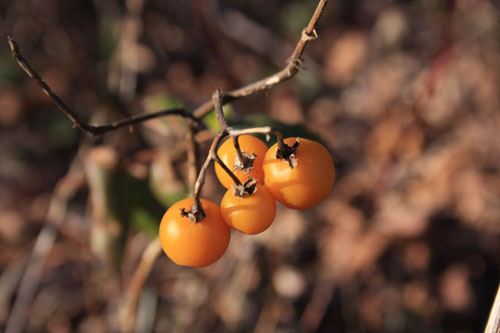
Fruits of winter, clinging to vine
(*photo
credit)
December
27, 2009 Give Sacred Space to Youth
The feast of the Holy Family is always
challenging to us, especially to those of us who do not have the
opportunity to raise offspring. What would I do if my pre-teen
charge should suddenly disappear, an event that causes consternation
in any family? We wonder what runs through the minds of Mary and
Joseph when Jesus' absence is realized. This was something new, a
beginning of an awareness that family life changes with time, and
nestlings abandon the nest and take up their own lives. Every
family learns that private space is demanded by all, even the most
perfectly acting youngster. Over-protection and constant cell phone
use is not good; youth also need silent space to find themselves.
Jesus is on his own psychological journey;
he has always been obedient and is still an exuberant youth, able to
move faster than kinfolks in that traveling group of old and young
-- moving slowly from Jerusalem back to Nazareth. His parents lose
contact with him, though he is confident that he can catch up after
attending to "his Father's business" in the temple. Here is a youth
breaking away, and what is most telling is that his parents become
willing to accept this as part of his journey of life, his ongoing
bar mitzvah. Anxiety is turned into joy, as Jesus rejoins
them and goes back to Nazareth and becomes obedient to them; he
advances in wisdom and age and favor. We realize that within the
Church the parallel of the Gospel of Luke -- the Acts of the
Apostles -- shows disciples forming new communities, each of
which advances in age and wisdom and favor before God and fellow
human beings.
All young people must be given the sacred
space needed for finding their own chosen vocation -- and parents
can only do so much. Unfortunately, with the great demands placed
on people today, youth grow up too fast. Parents pay for a variety
of youthful needs and especially costly higher education; debts
mount. Thus today the pressure is to conform to parental
expectations and acquire a paying job in the best position possible
and in the shortest time. Previous volunteer opportunities are at a
premium. In this brief window into Jesus' early life, Mary realizes
that her family is not static but a dynamic reality. Jesus would
move on, for he is on a mission. Mary ponders in her heart this
event among others in the brief and hidden history of his growing
up.
The Holy Family's qualities include
compassion, kindness, humility, mutual forgiveness, obedience of
children (Colossians 3:12-17). Compassion involves pondering in our
hearts; kindness is needed for creating healthy home environments;
humility permeates all family relationships; mutual forgiveness
heals old wounds and invites new life. Through obedience, Jesus
submitted to Joseph and Mary -- and he grows in wisdom and age and
grace into adulthood.
Prayer: Lord, help
our families to imitate the Holy Family itself, and to have the
courage to submit to your will and share in mutual respect for the
needs of each other. Let all be patient to assist and
support those who are growing into maturity.

The simple play of a puppy
(*photo
credit)
December
28, 2009 Teach the Innocents to Pray
Holy
Innocents Day is a
perfect time to consider the thousand children throughout the world
who will die today from preventable diseases and malnutrition. They
are part of an extended community of the newborn male babes who were
killed by Herod in the environs of Bethlehem two millennia ago. The
innocents of all ages whose lives were shortened by human malice or
lack of sharing of resources were never able to reach their full
potential of a long life and service to others. Little wonder that
for centuries this feast was placed very close to Christmas and the
Christ child.
Many people young and old in our busy
secular world take no time to pray and find the question "Do you
pray?" somewhat embarrassing. They will admit the need for prayers,
and even ask others to pray for them. They recognize the need for
assistance from the Almighty; yet they consider themselves as
having more pressing things to do then to beg in prayer or to thank
God for gifts given. Everyday private prayers are somewhat foreign
until these people are caught in the ongoing news of deaths from
terrorists, illnesses, auto accidents or examinations.
If parents are part of this group of the
infrequent "prayers," then what about their children? Are they
being taught their morning and evening prayers -- the Our Father,
the Hail Mary, the Sign of the Cross, Grace before
Meals While these are common prayers with set formulas, they
become personal and familial through use over time. Adults and
youth, who spend time praying together, stay together. Do youth see
parents get down on their knees, or just sit quietly and pray at the
start or finish of the day. Teaching a particular prayer is one
thing; however, seeing another pray is a more powerful way of
teaching the young the need to spend time with God. At public
functions some youth know common prayers and some seem very
embarrassed by their own ignorance. Let's pray that parents take
the task upon themselves to pray for and with their children.
Teaching youth has added advantages for
parents and guardians: the prayers of the young are powerful, and we
grow in understanding this with time; the prayer of youth can be
very sincere and this causes parents and others to give more
attention to their own prayer time. Furthermore, parents realize
that what is taught now is an investment for the future, for a habit
of prayer can endure for someone's lifetime long after the teacher
is gone. All of us need God's help and yet we are sometimes
remiss. A few can be seen praying at shrines or at restaurants
before a meal, or using prayer rugs at rest stops. Let us all learn
from those who pray in public; hopefully they may teach us all to
pray. The millions whose lives are cut short cry to heaven for a
greater share of the world's plentiful resources. This is something
for all, young and old; we can all join in an act of prayer at
year's end.
Prayer: Lord,
inspire us to teach the young to pray, for their prayers are
powerful.
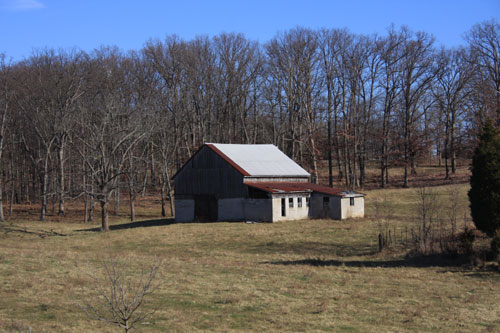
Anderson Co., KY barn
(*photo
credit)
December
29, 2009 Consider Insulated Window Shades
Some of us put plastic on doors or windows
that need more adequate insulation during the winter season.
However, there are more permanent devices that, once installed, do
not have to be put on and taken off with each heating season. One
such permanent conservation measure that combines good ecological
practice with craft and art is the insulated window shade. This
device comes in a variety of designs and can be effective,
economical, and attractive for solving both winter's cold and
summer's heat problems. Around one-quarter of the winter domestic
heat or summer cool air loss may occur from uninsulated windows
through four different ways: infiltration in gaps in the window,
conduction, convection, or radiation.
Infiltration can be blocked by caulking,
weatherstripping, storm windows, or a layer of plastic over the
window. However, the window shades can also do a very effective job
in stopping energy loss. Conduction is averted by the forming of a
blockade of insulation and then trapping the air; convection is
blocked by the sealing of the edges so that air currents cannot
develop; radiation is reversed with the inclusion of a reflective
surface, which has the same effect as aluminum foil reflecting the
sun's rays. To make an effective insulating shade one needs one or
more layers of insulating (air-trapping) fabric (e.g., batting), a
reflective surface (e.g., Astrolon), a vapor barrier (e.g.,
plastic), and some way of sealing the shade on all sides.
These shades are more effective, if
carefully constructed using good insulating materials and fitted
tightly to the frame of the window. This tight fitting may be
performed either by the use of velcro on the edges of the shade and
frame or by a wood frame shutter that closes after the shade is
lowered. A roller and a Roman shade can be modified into a quilted
roller shade made with layers of insulating materials, and covered
on the inside with a quilted mat with Appalachian quilt designs.
For effective results in winter, the shade is raised in daytime to
allow maximum solar gain and sealed or pulled down in the evening
for maximum insulation. In summer, the shade can be lowered in
daytime to serve as a sun block, or kept lowered in order to
conserve cooled air within the room. Making window shades is one
way less mobile people with sewing skills can be effective energy
conservationists. The product of their hands can be appreciated as
a work of art even well after they have passed on.
ASPI has some examples of insulated window
shades both in the Solar House and in the Mary E. Fritsch Nature
Center. One set is fastened with wooden shutters and the other has
Velcro strips to hold the shade tight to the window frame. ASPI
also distributes Quilted Insulated Shades, Technical
Paper-21. More information can be found on the website
<www.a-spi.org>.
Prayer: Lord, help
us see that conservation work can be artistic, exciting,
economical, effective and permanent.

A rose to celebrate the end of 2009
(*photo
credit)
December
30, 2009 Count Your 2009 Blessings
Our Christmas season includes many blessings
that we take for granted and that people of two centuries back could
have hardly dreamed about. Recounting these blessing is a blessing
in itself:
* A lively faith that the Lord has
come among us, and is to come again soon to establish a New Heaven
and a New Earth, which we are to help bring about through our
collective efforts;
* The ability to use our own bodily
functions (seeing, hearing, thinking, etc.) to the degree needed;
* A plentitude of nutritious food
that can be stored safely, potable water, sufficient clothes, fresh
air and all of life's basic essentials;
* Available medicines and measures to
protect us from the illnesses that beset so many, along with health
facilities and conscientious and devoted care givers;
* Accessible transportation to take
us easily to distant places in all but the worst weather;
* Instant communication allowing us
to speak on the phone to distant relatives and friends, and to send
them rapid messages via the Internet;
* Warm lodging that protects us from
the harsh elements, and can be heated without an enormous
expenditure of time and effort;
* Adequate education and literacy to
know the basics of language and to negotiate the demands of modern
life;
* Freedom of religion to
celebrate the sacred events of this time and place without fear of
persecution;
* Basic security that is not perfect
but does permit most of us to rest securely at night and without
fear of major disruptions in our normal lives;
* Friends and relatives who give and
receive support, and service personnel who defend us, protect us,
risk being in harms way for us, and are willing to come out when we
are in need;
* Wholesome entertainment that can
keep us contented during this holiday season; and
* Many things we have forgotten
because of our limited memories.
Prayer: God, Giver
of all good gifts, we thank you for blessing us in 2009 in many
ways. Help us extend this sense of gratitude to all our
relatives, friends and neighbors.

Seed pods in winter, new life awaits
(*photo
credit)
December
31, 2009 Glance Back and Look Ahead
The last day of the year is like careful
driving -- looking back in the rear mirror frequently and still
keeping our eyes peeled ahead on the coming 2010. Past experience
and future plans coalesce in making this a precious moment at year's
end -- when we turn our minds to a combination of thanks for what
has happened and petition for what lies ahead. Glancing back
involves an examination of where we came from; looking ahead calls
for plans as to where we intend to go. Both are spiritual
exercises; the past involves twists and turns and detours serving as
guides, for we shape our past into a grand experience; the future is
a horizon that is as bright as we are willing to help create it.
The past glance includes the good and
the bad, the successes for which we are thankful and the failures
for which we ask forgiveness. We cannot walk backwards for long, or
else we fall again. God forgives, and thus we turn our face to the
future. While glancing back for this moment, let's list all the
achievements of the past year, the people served, the times of
celebrations, the health and mobility and happiness we gave and
received. We may review our daybook or our memories. It may be
interesting to see where we were in January and how much our plans
and life have changed in twelve short months. Are we the wiser for
what has occurred? What about the unexpected deaths, illnesses,
stresses and other events that entered our lives? How much did we
become concerned about the economic and political difficulties of
our neighbors near and far?
Looking ahead
involves a faith in a future that is to come, and a hope that all
will go well. Some of us may ask a series of questions; others may
practice a certain indifference that says, "let it come to be;"
still others may find an uncertainty that can be stressful in
itself. For believers in an eternal life ahead, the future, while
somewhat indefinite, does have a core perspective that colors how we
approach the coming year. The eternal life is like a sun just
behind the horizon, and its eventual rising is our hope that orients
us and draws our attention. Our past directs us as a guide; our
future inspires us as a dawn of new possibilities that lie ahead.
With both of these we engage in the present moment, the NOW of our
lives.
In an abbreviated format this could be more
than a yearly exercise. We may resolve to spend a few moments at
the end of each day counting up our activities and finding how we
adjusted to the time, the prompting of the Spirit, and our successes
and failures. Again we seek forgiveness and also thank God for
letting us live that time and to be of service. St. Ignatius Loyola
regarded these daily examinations as the most essential daily
exercise. Consider the daily examinations of 2010 as a miniature of
what we are doing here and now. May our 2009 exit be our 2010
doormat.
Prayer:
Lord God,
we thank You for bringing us to this point. Forgive us for when we
tripped and fell. Help us rise up with new vigor and eagerly take
on the challenges of the coming year.
|